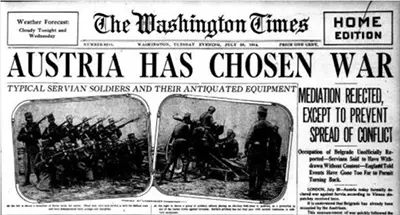Austria Declares War
Austrian-Hungarian Empire Backstory
A union between the Austrian Empire and the Kingdom of Hungary, they were considered a powerful union in their prime. The loss suffered in 1918 after their defeat in World War 1 led to many things, including the signing of the Armistice of Villa Giusti which ended the conflict for the Empire.
The Austrian-Hungarian Empire was not well equipped for war, and was heavily dependent on German leadership when it came to military operations. The war led to many casualties on their side, with the resulting chaos sending their economy into a tailspin.
With the collapse of the Monarchy, the final blow came when American Secretary of State Robert Lansing backed the Czechs, Slovaks and South Slavs. This led to the dissolution of the Austrian-Hungarian Empire and a rebuilding process that took years.


Serbia Backstory
The story of Serbia goes all the way back to the early Middle Ages, when they were recognized by Rome and Constantinople in 1217. The many power struggles over land and materials in its history eventually led to the Serbian revolution, and took place from 1804-1835.
The fighting was mainly about independence from the Ottoman Empire, and led to what is known as the first written Constitution, effectively ending feudalism and serfdom. The results of World War 1 left Serbia reeling, much like the rest of the world. Counting both civilians and army losses, Serbia lost 27% of its entire population.
Serbia would later join with Montenegro to form State Union of Serbia and Montenegro in 1992. This partnership was broke off in 2006, when Serbia would declare its independence once again. They are a member of the UN, and are currently considered a neutral state.

Why Did the Austrian-Hungarian Empire Declare War On Serbia?
The assassination of Archduke Franz Ferdinand of Austria and his wife by the hands of a Serbian nationalist in Sarajevo led to the Austrian-Hungarian Empire declaring war. Tensions were already rising between the two before the murder, and didn’t get better when Serbia refused to cooperate during the murder investigation.
The Austrian-Hungarian Empire had the support of Germany, offering Serbia an ultimatum on July 23, 1914. Part of the demands included an Austrian led investigation into the murders, and that all anti-Austrian propaganda in the country of Serbia be suppressed. Serbia accepted these demands and others, only refusing one.
Only 2 days later on July 25th, the Austrian government moved forward with military operations and broke all diplomatic relations with Serbia. Around this time is when Serbia gathered their own mighty ally in Russia, powerful in form even when compared to Germany.

Who Was Affected?
The Austrian-Hungarian Empire was majorly affected, losing a war that led to their dissolution. A once powerful monarch was crushed and never gained the power it once had, leaving the economy in question for years.
Germany was exposed a little by backing their ally, as it was found over the course of the war that German military intelligence was far superior and often had to pick up the slack for their ally.
Serbia suffered major losses to both its army and population, even though it was considered a win. The war however did give the country major points in history when it came time to declare their independence again

Names to Remember
Archduke Franz Ferdinand of Austria was the royal Prince of Hungary and Bohemia. He was the presumptive heir to the Austro-Hungarian throne, and the eldest son of Archduke Karl Ludwig of Austria.

Important Facts
Here are some important things to remember about the war. The list contains some great facts to help you get a better idea of where everyone stood in the attack.
- The war started due to the assassination of Archduke Franz Ferdinand of Austria and his Wife
- Serbia lost 27% of its entire population and turned to Montenegro for a union in 1992
- Germany was the ally of the Austrian-Hungarian Empire and Russia was an ally of Serbia

Summary
The rising tensions between the two countries led to an inevitable war, even after Serbia accepted most of the demands in the ultimatum. The lack of military expertise ended the Austrian-Hungarian Empire, but with heavy casualties from both sides.



